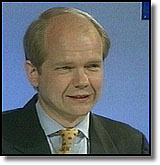
|
Hague Plans 'Back Me or Sack Me' Party OverhaulThe Conservative leader William Hague has outlined plans for a shake-up of his party's constitution, and has invited Tories to back or sack him. His proposals appear designed to address the 'sleaze' issue, in order to prevent another series of scandals like those that dogged the Conservatives during their last days in office.Mr Hague was candid about why his party suffered such a spectacular defeat on May 1st. In a speech before senior party figures at Conservative Central Office in London, he said: "The simple fact is that the voters believed we were divided among ourselves. They believed we had lost touch with some of the people we always said we represented. They formed the view that there was more than a hint of arrogance and conceit in the ranks of our parliamentary party. They questioned our motives and sometimes our competence." Mr Hague wants a major redesign of the party's structure. This would include:
Mr Hague plans to travel around the country explaining his proposals for reform. His ideas will be set out in a discussion document to be debated at the annual conference in Blackpool in October. In the spring the party will hold a special meeting to launch the new constitution. No More SleazeBut Mr Hague was eager to stress that the new rules would not be abused by the leadership to silence mavericks. "We will never seek to use these powers to remove from our party those political dissidents and parliamentary mavericks who, however, frustrating their behaviour may be for the leadership of the day, can be a source of strength to the Conservative cause in the long term." The Tory leader also announced that the party would no longer accept foreign donations to its funds and that the party would list its major donors alongside its published accounts. He said the party must be more open about its funds: "In not being so in the past, we have often appeared secretive and defensive, and we have paid a political price for that. It is time to be much more open. We have nothing to hide and nothing to fear." Power to the GrassrootsIn future leadership elections, every party member would have a vote exercised through an electoral college, but wieghted in favour of MPs. Mr Hague told his audience that party membership had fallen from over a million in 1979 to just a few hundred thousand today; the average age of party activists is 64. "We are certainly not much bigger than a large football club, and we have not always been as popular as a football club," he said. The party was told to extend its membership among the ethnic minorities: the leader wants more black, Asian and female MPs. New StructureTher governing body's chairman will be appointed by the leader with members drawn from all sides of the party. Mr Hague emphasised the need for the central organisation to listen to the views of the grassroots and consulting party members more often. And he wants a national membership system, nstead of the present situation where Tories belong to local associations. Listening Party
|
Diana, Princess of Wales, 1961-1997
Conference 97
Devolution
The Archive
News |
Issues |
Background |
Parties |
Analysis |
TV/Radio/Web
Interactive |
Forum |
Live |
About This Site
News |
Issues |
Background |
Parties |
Analysis |
TV/Radio/Web
Interactive |
Forum |
Live |
About This Site
© BBC 1997 |
politics97@bbc.co.uk |
